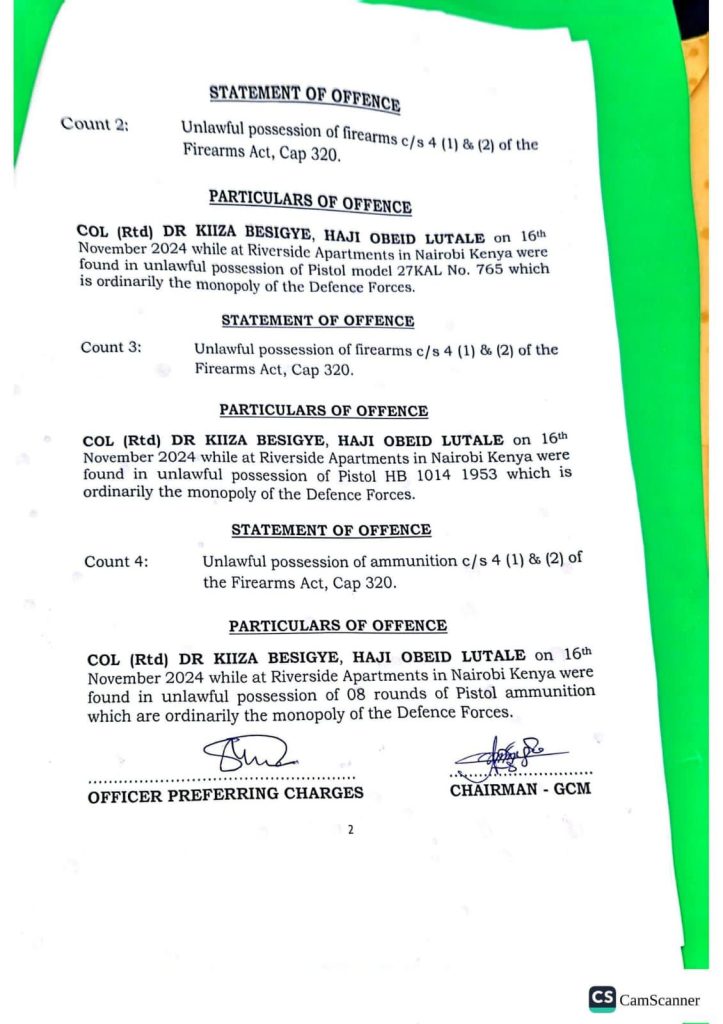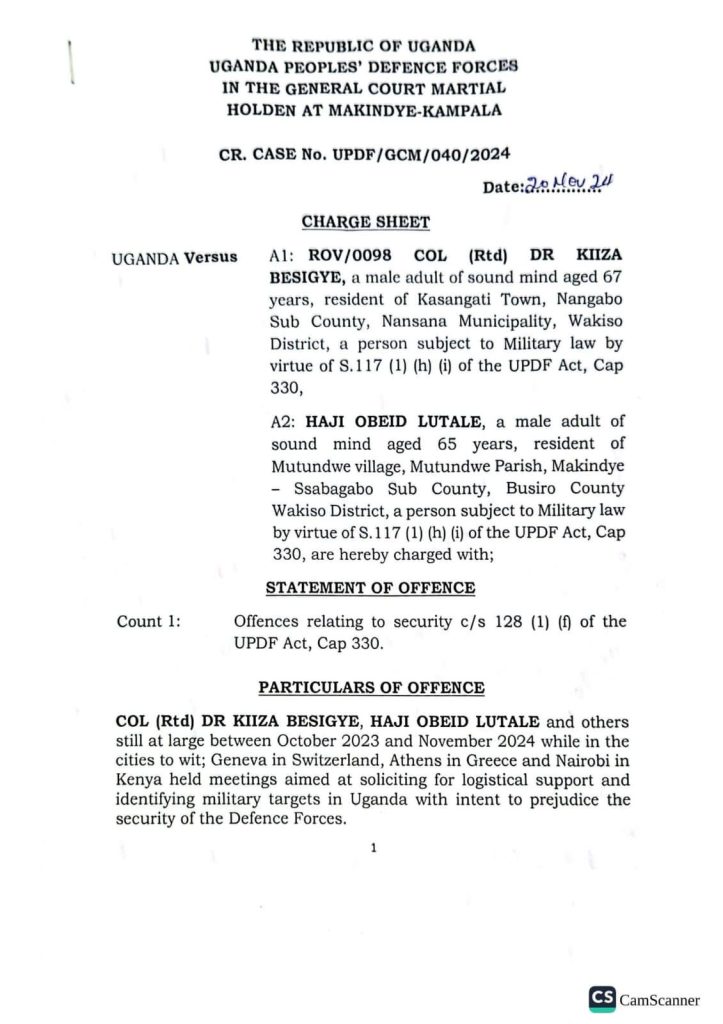On November 16, 2024, Dr. Kizza Besigye, a veteran Ugandan opposition leader, was reportedly abducted in Nairobi, Kenya, and transported to Uganda under circumstances that have drawn widespread condemnation. His detention under military custody in Uganda’s General Court Martial, coupled with Kenya’s alleged complicity in the cross-border operation, has sparked an international outcry and serious questions about the erosion of human rights and the rule of law in East Africa.
This report delves into the events, reactions from key stakeholders, and the implications for regional democracy.
Dr. Besigye, a prominent critic of Ugandan President Yoweri Museveni, was reportedly arrested by unidentified individuals in Nairobi. He was transported across the border without formal extradition procedures, violating Kenya’s sovereignty and international legal norms. Upon arrival in Uganda, he was placed in military custody and charged with offenses including:
Possession of Ammunition: Alleged possession of military-grade ammunition.
Negotiating for Arms with Foreign Entities: Accusations of engaging in arms dealings outside Uganda.
The charge sheet issued by the General Court Martial accuses Dr. Besigye of acts “injurious to the peace and stability of Uganda,” claims he has vehemently denied.
Eyewitnesses in Nairobi reported seeing Dr. Besigye being forcibly taken by individuals believed to be Ugandan security operatives. Local media houses in Kenya, including The Star and Citizen TV, provided extensive coverage of the incident, highlighting the mysterious circumstances surrounding his disappearance and the subsequent diplomatic tensions between Kenya and Uganda.
Political analysts in Kenya have expressed concern over the implications of such actions on regional stability. Dr. Michael Oloo, a regional security expert, stated:
“Cross-border abductions undermine trust among East African Community member states and jeopardize efforts to foster cooperation and peace. It sets a dangerous precedent that could destabilize the region.”
Ugandan Justice Minister Kahinda Otafiire’s remarks further muddied the narrative. He stated:
“I’ve asked my immigration officials at Entebbe Airport, and they clearly said Besigye did not have any gun when he was checked. I also asked the Nairobi airport officers, and they said the same.”
This statement casts doubt on the validity of the charges against Dr. Besigye and raises serious questions about the motivations behind his arrest and detention.
Meanwhile, Deputy Defense Spokesperson Col. Deo Akiiki attempted to justify the operation:
“No matter who you are and which country you are in, if anything you are doing is injurious to this country or the region, then we shall come for you.”
Such rhetoric has been widely condemned as an endorsement of extrajudicial actions, further undermining Uganda’s credibility in handling this case.
The Kenyan government has come under scrutiny for its alleged involvement in Dr. Besigye’s abduction. Principal Secretary at Kenya’s Ministry of Foreign Affairs, Korir Sing’oei, stated:
“The detention of Dr. Besigye was not the act of the Kenyan government. The Ministry of Interior has commenced investigations into how Dr. Besigye was forcefully removed from premises in our country and taken to Uganda.”
This statement indicates Kenya’s official stance of non-involvement and a commitment to investigate the incident. However, the lack of immediate action and transparency has drawn criticism from various quarters.
The abduction has drawn sharp rebuke from the international community. The Bureau of African Affairs under the U.S. State Department expressed concern, with Assistant Secretary of State Molly Phee tweeting:
“We are closely following reports on the abduction and transnational rendition of civilian political figures @KizzaBesigye1 and Obeid Lutale from Kenya to Uganda. It is important that the circumstances be clarified with transparency and full legal protections.”
Human Rights Watch (HRW) also issued a statement, describing the incident as a blatant violation of international law. HRW called for:
Immediate release of Dr. Besigye.
An independent investigation into the operation.
Assurance of legal protections for all political detainees.
Winnie Byanyima, Dr. Besigye’s wife and Executive Director of UNAIDS, spoke to the media from Geneva:
“My husband’s abduction is not just an attack on him but on all Ugandans fighting for freedom and justice. The charges are baseless, and his detention is a sham designed to silence opposition voices.”
Byanyima has called on the international community to hold both Uganda and Kenya accountable for this grave violation of human rights.
The abduction contravenes several key legal frameworks:
Extradition Protocols: These require formal legal procedures and hearings in a court of law, none of which were observed.
Breach of Sovereignty: Kenya’s failure to prevent foreign operatives from conducting missions on its soil undermines its sovereignty.
Violation of International Law: The Vienna Convention on Diplomatic Relations and Article 9 of the ICCPR prohibit arbitrary arrests and transnational renditions.
Dr. Besigye’s trial in Uganda’s General Court Martial has drawn criticism for the continued use of military courts to suppress political dissent. Military courts, by design, lack the impartiality and transparency required for fair trials, particularly for civilians.
The abduction of Dr. Besigye and the subsequent erosion of judicial independence in Uganda highlight a disturbing trend in East Africa. This incident sets a dangerous precedent for authoritarianism, cross-border operations, and the suppression of political opposition.
Justice Minister Norbert Mao summarized the threat to democracy:
“These things turn our laws into a joke. We must empower our institutions to uphold the rule of law.”
The abduction and military detention of Dr. Besigye demand urgent action from both regional and international bodies. Key demands include:
Immediate Release: Free Dr. Kizza Besigye and all other political detainees.
Independent Investigations: Conduct transparent inquiries into the roles played by Kenyan and Ugandan security agencies.
Legal Reforms: Strengthen safeguards against political interference in judicial processes.
The world is watching, and the fight for justice and democracy in East Africa cannot afford to falter.



